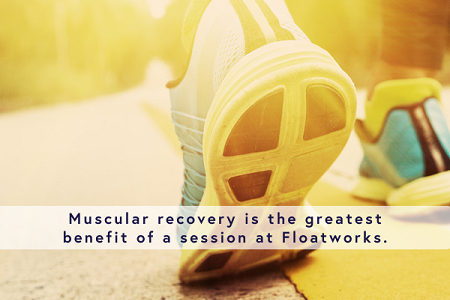How floating boosts physical performance
We take a scientific look at how floating impacts physical performance and recovery.

Ever since John C. Lilly first developed floatation tanks, isolation tanks, sensory deprivation tanks or whatever you want to call them, back in 1954, floating has been used to effectively alleviate ailments and boost performance. But how does soaking in a giant tub of salt water technically benefit you physically? We explore the science beneath the surface.
Sleep
Floating can help you sleep like a baby. A quiet, restful, contented baby. A 1999 research study found that during floatation, there’s an increase in the theta waves in the brain. Other studies have shown these waves are activated by meditation and are also active during REM (rapid eye movement) sleep, as well as the drowsiness you feel immediately before and after sleeping.
Fitness coach @JamieSawyerFit recently tweeted that he “had the most relaxing experience @the_floatworks yesterday. Incredible sleep which resulted in an awesome workout today! Floating is definitely up there for me in terms of getting the most efficient recovery”.
Athletes and fitness coaches recognise the importance of a good night’s kip. “Better rest = better training,” continues Sawyer, who has worked with the likes of boxer (and Floatworks floater) David Haye, as well as actor Gerard Butler, to get them in tip-top fighting shape.
When you sleep your body repairs and rebuilds after the strains of exercise and everyday life. And if you’re suffering from illness or injury, or are wracked with nerves ahead of a vital sports match or charity race, a session of floatation can help put you at ease.
Had the most relaxing experience @Floatworks yesterday. Incredible sleep which resulted in an… https://t.co/ZpOir7utHV
— Jamie Sawyer (@JamieSawyerFit) 6 October 2016
Stress and pain relief
A 2001 study published in Pain Research & Management found floatation – also known as restricted environmental stimulation technique (REST) – played a strong role in reducing severe pain, decreasing anxiety or depression, and even boosting optimism. Participants in the study also reported falling asleep more easily.
Nothing like that zero-G feeling in a Floatation tank to finish my Sunday! #floatyourboat @london_float pic.twitter.com/C536fYkkTB
— Petros (@Petros_SP) 2 October 2016
@Petros_SP, here, recognises the soothing quality of a weekly float but these benefits aren’t merely anecdotal. Research in the same 1999 study found floating reduces unwanted negative activity in the body.
Alongside this, the study found a significant decrease in levels of plasma and urinary cortisol, ACTH [adrenocorticotropic hormone], aldosterone, renin activity, epinephrine (adrenalin), heart rate, and blood pressure – all of which are directly associated with stress.
In other words, floating quells negative reactions in your body and encourages positive ones. Awesome, if you ask us!
Weight management
Floating alone won’t help you stay on top of your body fat levels, but it can support regular exercise and a clean diet by suppressing the hormone largely responsible for weight gain.
A 1990s study by Thomas H. Fine, who now runs PTSD research at the University of Toledo College of Medicine, found subjects’ levels of the stress-signalling hormone cortisol dropped by 22% after eight 40-minute float sessions.
Several studies, old and new, have shown that increased cortisol results in increased weight gain, especially for abdominal fat.
Keep cortisol levels at bay and swerve the occasional jammy doughnut and you’re on the right track to keeping a trim midriff.
Muscle recovery
Along with physio, massage, supplements and weight training, floating is increasingly becoming an intrinsic part of an athlete’s training regimen.
Personal trainer Tanya Morgan, who’s a regular here at Floatworks, recently talked us through how floating has impacted her training. “Since I’ve started floating regularly, I’ve noticed a huge difference when it comes to muscle recovery,” Tanya explained. “I do a lot of boxing and weight training, and going into the gym the next morning after a float can feel like I’ve had days of rest. My body feels like it has totally recharged, and I feel much lighter, stronger and more energised.”
As well as Tanya, Britain’s mixed martial artist Jimi Manuwa, who recently moved to the Number 5 Light Heavyweight in the world, uses his time here at Floatworks to recuperate after punishing sessions in the octagon.
Amazing experience @Floatworks after 2 monster sessions today. Thanks guys x pic.twitter.com/FK3PJGqfwx
— JIMI MANUWA (@POSTERBOYJM) 6 September 2016
The main ingredient in his recipe for recovery? Magnesium.
Epsom salt in the water, that helps you stay buoyant, is made up of magnesium and sulfate. Magnesium is responsible for more than 300 essential metabolic reactions in the body and yet adults in the UK are commonly deficient in it. You can top your levels up by feasting on pumpkin seeds and spinach, or you can soak it up while floating.
Raising your magnesium levels can improve circulation, improve your body’s ability to use insulin, ease muscle pain, regulate electrolytes, and relieve stress.
And in Jimi ‘Posterboy’ Manuwa’s case, produce one of the knockouts of 2016.
Are you a budding Olympic superstar? Or even just an avid sports-lover? Check out our latest floating offers to find out firsthand how floating will increase performance…










